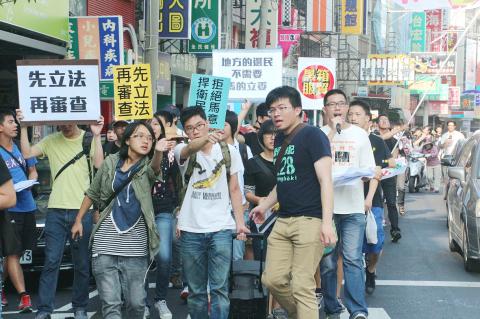The student-government conflict over the cross-strait service trade agreement has seemingly extended overseas as student representatives accepted an invitation from the Washington-based Formosan Association for Public Affairs (FAPA) to hold a press conference in the US the same day as President Ma Ying-jeou (馬英九) was holding a video conference with a Washington think tank yesterday.
During the president’s teleconference, organized by the Center for Strategic and International Studies as a part of events marking the 35th anniversary of the signing of the Taiwan Relations Act, Ma conveyed to the US audience the direction of his government’s cross-strait policies, as well as Taiwan’s resolve to integrate with the wider regional economy by joining the Trans-Pacific Partnership (TPP) and Regional Comprehensive Economic Partnership (RCEP) trade pacts.
If Taiwan could join the TPP, it would be beneficial to the nation and all other TPP members, Ma said, adding that it would safeguard the Taiwanese economy and strengthen the US’ economic strategy in Asia.

Photo: CNA
When asked by US academics about the student-led protests over the Ma administration’s handling of the cross-strait service trade agreement, Ma said his administration would work to communicate the benefits of the pact to the public.
Saying he understands people’s doubts and fears of overt reliance on China, Ma said that since he assumed office Taiwan’s exports have been distributed to many other countries.
The diversification of exports — not placing all the nation’s eggs in one basket — is an important part of the government’s ongoing economic polices, Ma said, adding that the results of such policies take time to come to fruition and are not instantaneous.
Meanwhile, student representatives Dennis Wei (魏揚) and Huang Yu-fen (黃郁芬), aside from attending the press conference hosted by FAPA, were also scheduled to conduct a talk with students at the George Washington University yesterday evening.
Additional reporting by CNA

The CIA has a message for Chinese government officials worried about their place in Chinese President Xi Jinping’s (習近平) government: Come work with us. The agency released two Mandarin-language videos on social media on Thursday inviting disgruntled officials to contact the CIA. The recruitment videos posted on YouTube and X racked up more than 5 million views combined in their first day. The outreach comes as CIA Director John Ratcliffe has vowed to boost the agency’s use of intelligence from human sources and its focus on China, which has recently targeted US officials with its own espionage operations. The videos are “aimed at

STEADFAST FRIEND: The bills encourage increased Taiwan-US engagement and address China’s distortion of UN Resolution 2758 to isolate Taiwan internationally The Presidential Office yesterday thanked the US House of Representatives for unanimously passing two Taiwan-related bills highlighting its solid support for Taiwan’s democracy and global participation, and for deepening bilateral relations. One of the bills, the Taiwan Assurance Implementation Act, requires the US Department of State to periodically review its guidelines for engagement with Taiwan, and report to the US Congress on the guidelines and plans to lift self-imposed limitations on US-Taiwan engagement. The other bill is the Taiwan International Solidarity Act, which clarifies that UN Resolution 2758 does not address the issue of the representation of Taiwan or its people in

US Indo-Pacific Commander Admiral Samuel Paparo on Friday expressed concern over the rate at which China is diversifying its military exercises, the Financial Times (FT) reported on Saturday. “The rates of change on the depth and breadth of their exercises is the one non-linear effect that I’ve seen in the last year that wakes me up at night or keeps me up at night,” Paparo was quoted by FT as saying while attending the annual Sedona Forum at the McCain Institute in Arizona. Paparo also expressed concern over the speed with which China was expanding its military. While the US

SHIFT: Taiwan’s better-than-expected first-quarter GDP and signs of weakness in the US have driven global capital back to emerging markets, the central bank head said The central bank yesterday blamed market speculation for the steep rise in the local currency, and urged exporters and financial institutions to stay calm and stop panic sell-offs to avoid hurting their own profitability. The nation’s top monetary policymaker said that it would step in, if necessary, to maintain order and stability in the foreign exchange market. The remarks came as the NT dollar yesterday closed up NT$0.919 to NT$30.145 against the US dollar in Taipei trading, after rising as high as NT$29.59 in intraday trading. The local currency has surged 5.85 percent against the greenback over the past two sessions, central